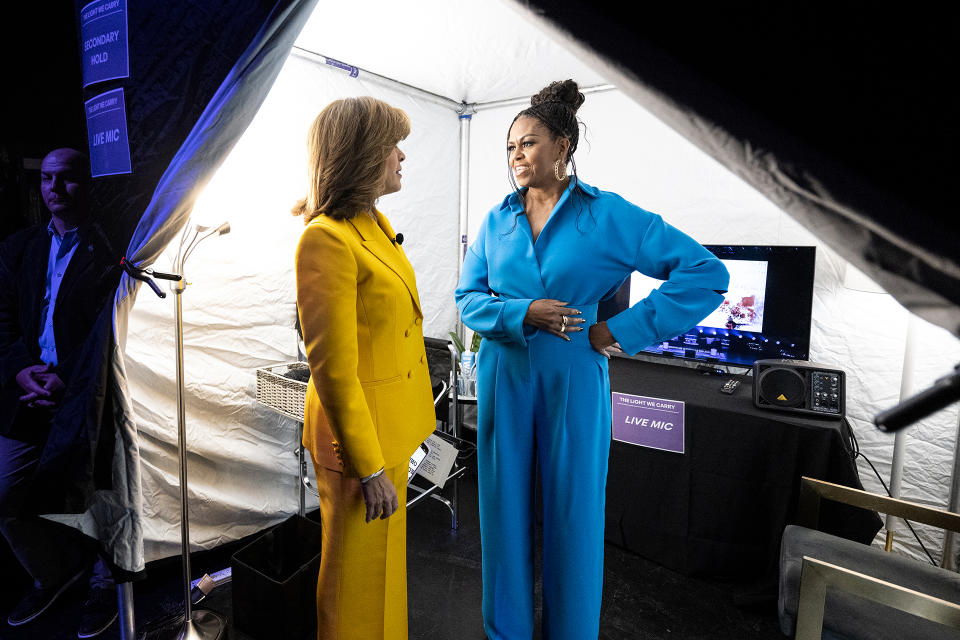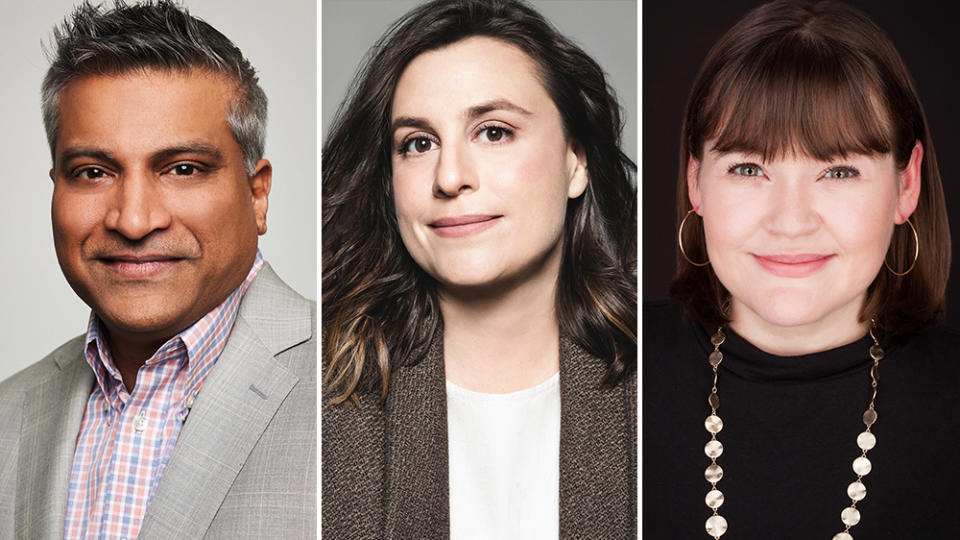Mother’s Day weekend 2019 marked a turning point in Madhuri Shekar’s young life.
It all started two years ago with a phone call from a woman named Kate Navin, then head of theater at Audible. Navin said she had recently received funding to develop original works by emerging playwrights, and she called to offer Shekar, just a year out of Juilliard, the opportunity to write. The only catch: Shekar’s piece would have to be made as an audio-only production.
More from Variety
Shekar’s answer to this challenge was ‘Evil Eye’, a 100-minute potboiler revolving around daily phone conversations between a mother in India and a daughter in Los Angeles. The completed piece was released on Audible in May 2019. For Shekar, the impact on her career was immediate. Within weeks, she was negotiating a deal with Priyanka Chopra Jonas and Blumhouse for the film version that premiered on Amazon Prime Video in 2020. She had never seen this coming – it had all felt like an experiment to her.
“I was looking for a challenge,” says Shekar. “I started from the point of thinking about what story I could tell that would really come to life for people who would hear it rather than see it. There was a lot of playing with the boundaries of the form; there was so much I could do by immersing you in the voices of these two women.
Immersion in theater of the imagination is the entertainment experience Audible most wants to deliver. The company has been around for more than 25 years as an audiobook distributor, but it only became known as an entertainment brand ten years ago. Then audio content began to evolve rapidly as smartphones gave more and more people the ability to access thousands of hours of music, podcasts, and audiobooks. The company does not disclose its figures, but the number of paid subscribers is estimated at tens of millions.
While long-form audio used to be the domain of stern-sounding NPR and BBC radio documentaries, the proliferation of titles and program formats has vastly expanded the boundaries of audio-only storytelling. Podcasts in particular have become popular source material for TV and film development. They are seen as a relatively cheap way to develop concepts and test out characters and worlds. But increasingly, audio-focused production companies like Audible and Wondery (both owned by Amazon), Campside Media, Gimlet Media, Kast Media, Crooked Media, Pineapple Street Studios and The Podglomerate are building businesses where making money through audio is the primary focus. . Audible has upped its game with original content, courting emerging writers like Shekar and established names like Kerry Washington, Jesse Eisenberg, Daniel Dae Kim and James Patterson.
As the audio sector experiences its own version of a Peak TV bubble, Audible hopes to stand out with stunning productions, high-quality sound design and other technical innovations befitting a company owned by Amazon since 2008. slate features a three-and-a-half-hour adaptation of George Orwell’s “1984,” starring Andrew Garfield, Cynthia Erivo, Andrew Scott and Tom Hardy. Muse’s Matthew Bellamy and Ilan Eshkeri wrote the score, which was recorded by the London Metropolitan Orchestra at Abbey Road Studios. In other words, Audible has written some larger-than-usual controls for this.
Audible’s investments in “event titles” are obviously attracting the attention of Hollywood creatives, especially at a time when traditional film and TV employment is becoming increasingly tight.
Kim, star of ABC’s “Lost” and “The Good Doctor,” sees audio content as a promising canvas for his 3AD production banner. The company signed a first-look development deal with Audible in early 2023, and the first production, a staging of David Henry Hwang’s 2007 play “Yellow Face,” will premiere on May 2. Kim and Hwang’s work on the Audible production was the catalyst for “Yellow Face,” which landed a spot in the Roundabout Theater Company’s 2025 season, starring Kim.
“There’s a huge opportunity here for content developed for TV and film, to include audio companions or to expand cinematic universes in ways we haven’t thought of yet,” says Kim.
Founded in 1995 by technology entrepreneur Don Katz, Audible is a pioneer in the world of on-the-go audio and streaming. Katz was frustrated with the experience of listening to audiobooks on cassette tapes, so he launched the world’s first portable digital audio player in 1997, almost four years before Apple introduced the iPod. (The first book to be downloaded on the Audible platform was John Gray’s 1992 self-help hit, “Men Are From Mars, Women Are From Venus.”) The Audible player never took off, but the companion Audible.com platform grew roots in the emerging dot-com company. It survived the market crash that followed the attacks of September 11, 2001. Seven years later, Amazon paid $300 million for the platform.
Today, the company offers 900,000 books, podcasts, plays and Audible originals for a basic subscription price of $95 to $150 per year. Audible’s platform offers a mix of free audiobooks and books that must be purchased from publishers for a fee. It’s a rabbit hole for anyone with an ounce of curiosity and a few minutes (or hours and hours) to spare. Currently, just over 40% of American adults say they have listened to at least one podcast in the past month. About the same number say they’ve listened to an audiobook, according to data from audio entertainment research firm Sounds Profitable. The podcast industry generates a total of about $2 billion per year in advertising revenue in the U.S., compared to about $14 billion for radio stations.
Michelle Obama’s “The Light” is one of Audible’s most popular original podcasts. Last August, the Obamas’ Higher Ground also launched the podcast interview series “Your Mama’s Kitchen,” hosted by Michele Norris.


Rachel Ghiazza, Audible’s Chief Content Officer, sees it as her mission at the company to continue to advance the latest developments in audio storytelling. “Our founder always says, ‘Audio is bought, not sold.’ We really have to take into account that people come to us because they want high-quality, well-executed words that are going to add something to their lives,” says Ghiazza. “We have a very robust post-production process. We made notes on edits, on dialogue and on shots. We then layer the sound design. It is a very long, thoughtful and well-executed process.”
Ghiazza came to Audible in 2019 from Spotify, which has emerged as Audible’s main rival.


“Audible has created a unique space for itself in spoken word audio,” said Tom Webster, partner and analyst for Sounds Profitable, which focuses on podcasting. “They offer more original content and they have had some successes. They are also, in a way that no other podcast company is, home to Walter Isaacson’s new book or Dave Grohl’s biography. If you want to hear a full audio production of a new book, Audible is the first place you go.
Dan Fierman, head of audio for Higher Ground and former editor-in-chief of ESPN’s Grantland, sees people tuning into podcasts and recurring audio programs as a modern version of reading magazines.
“What I find so exciting about audio is that it is as close as possible to those great monthly and weekly magazines, which sit nicely in the middle between in-depth reporting, news and entertainment,” he says. “When I think about building our podcast list, I think about building a magazine: you have your middle-of-the-book features, the popcorn at the front of the book, you have your critics. ”
The introduction of the iPhone in 2007 made it possible for people to easily access thousands of hours of spoken word content. The pandemic gave more people time to scroll through those options and sample from a growing selection of podcasts and audiobooks. But long before the COVID lockdowns hit, Audible management knew it was time to go for it with a broad menu of original productions.
When you analyze subscribers’ listening patterns, “you see that people are listening to a lot of different things all the time. It is not necessarily the case that there is something top and that 20% of customers listen to it,” says Ghiazza. “You see that there is a wide variety of listening options: both things that have just come out and things that have been out for a decade or two. That was a discovery I made when I came to Audible that I thought was incredible.”
Pat Shah, global head of content acquisition, strategy and partnerships, joined Audible in 2020 after holding senior roles at Spotify and Twitch. In his experience, audio content is consumed differently than other media. “There’s an intimacy that comes from audio when someone is talking in your ear,” says Shah. “There’s an audio element to it that’s more than just entertainment. It’s really about being part of someone’s life.”
Audible’s pitch to the creative community, especially Hollywood in its moment of disarray, was simple and clear. “The core of it is matching our expertise with your creative energy,” says Navin, now head of creative development at Audible for North America. “We’ll let you come in with an idea that you find interesting, and let’s talk about the right way to tell it in audio.”
There’s no doubt that Audible also benefits enormously from its access to Amazon’s deep pockets and proximity to its vast digital infrastructure for selling and cataloging books. “Honestly, we have the audience,” says Navin. “We’re not trying to find a business model. And I think that’s a very attractive proposition for Hollywood right now.”
The boost from “Evil Eye” continues to pay off for Shekar, who is writing for the upcoming Netflix drama “3 Body Problem” and developing her own drama series for the streamer. “A Nice Indian Boy,” a feature film based on her play of the same name, premiered at the SXSW festival this month.
Shekar sees that audio productions have significant potential to help writers develop and even finance stage productions. “So many great playwrights are getting an opportunity through this commissioning program,” says Shekar. “I wish more people in theater were experimenting with ways to sustain our industry.”
Fierman credits the Audible team for working hard to differentiate their original productions with layered audio effects, sharp sound mixes and other touches that stand out to listeners’ ears. “Good work requires pushing and pulling,” he says. “It’s not the first 95% – it’s the 96% to 100% that take good work and elevate it to great work.”
The Audible team is built for this kind of white care because, Fierman says, “they’re adults. They’re not just trying to make the next true crime/corpse thing. They approach things with real care and real smarts. That’s why we’re there.”
Best of variety
Sign up for the Variété newsletter. For the latest news, follow us on Facebook, Twitter and Instagram.